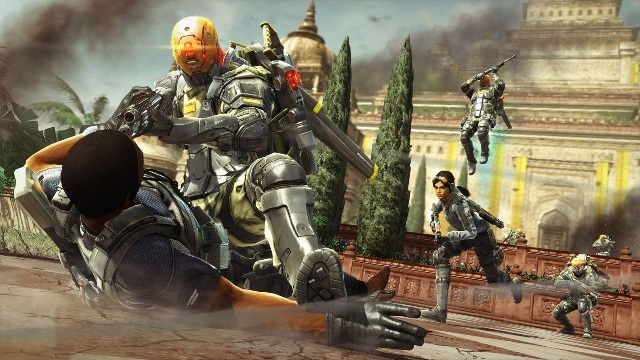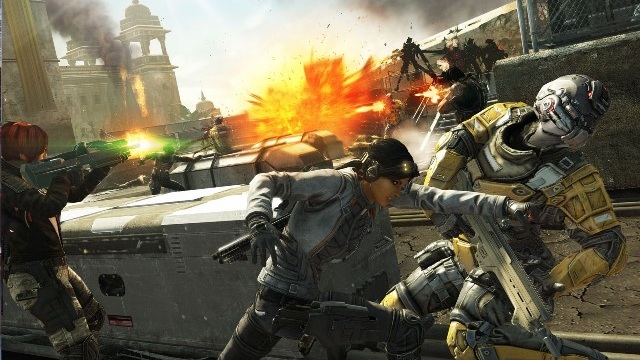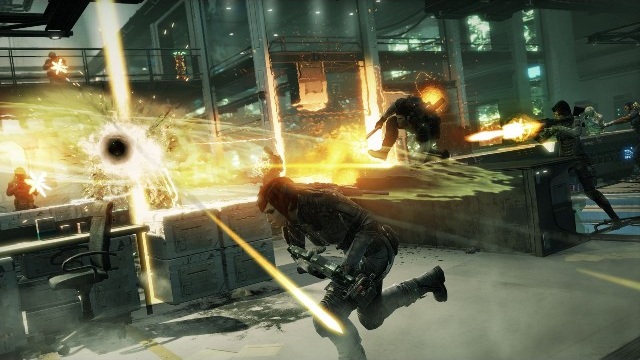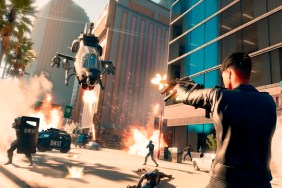A short Fuse.
Fuse is a victim of its delayed development cycle. Back in 2010, Insomniac Games hinted at the development of this title and revealed the game in 2011 under a different name, Overstrike, but then reworked the branding for several years before deciding on its current form. Unfortunately, the standard of video games has risen, so while most of the title’s features still hold up, several parts do not.
That said, Fuse has a handful of noteworthy concepts, particularly when it comes to co-operative play and convenience. Its design, both for single-player or multiplayer, thoroughly supports up to four players working together to take down waves upon waves of armored soldiers and giant robots. It even has local split-screen. Experience points are shared across modes, and the three characters of the squad you aren’t controlling still earn a portion of the experience points so that no one is left behind.
Complementing this is the Leap system which allows you to swap control to any character that isn’t being handled by another player. There’s nothing wrong with sticking with one of the four squad members–Dalton, Jacob, Naya, and Izzy–throughout the campaign, but you’ll want to switch between them if just to take advantage of each character’s specific Xenotech weapon, powered by the titular imaginary element Fuse: Dalton’s Magshield prevents all bullets from penetrating a rectangular barrier; Jacob’s Arcshot skewers enemies from afar and has bullets that can be ignited on command; Naya’s Warp Rifle creates singularities and allows her to cloak herself for lethal assassinations; and Izzy’s Shattergun crystalizes enemies for crowd control and she can deploy a healing beacon that automatically heals and revives allies within its area of effect.
Any character not controlled by a human player automatically yields to surprisingly competent AI control. They won’t be as useful as another human player, but they know well enough not to steal your kills nor pop their heads needlessly out of cover. Since the death of any squad member means a sudden game over, they will come to your aid almost immediately if you’re down.
As a cover shooter, Fuse has a fluidity not far from Uncharted‘s that effectively transitions between climbing, finding cover, dodging, and shooting. The level design, however, is rudimentary with linear corridors and unnecessary stealth sequences, and the various objectives are boilerplate: hack a door here, ride an elevator there, grab weapons here, carry an object there. But there is enough variety in the one-handed and two-handed sidearms as well as the enemies, like spec-op snipers, cloaked infiltrators, helicopters, flying Whistlers, and Enforcer mechs, that the action never gets too dull.
The trouble, however, is that Fuse has too many qualities that are borderline generic. None of the characters have memorable personalities, and apart from their unique Xenotech weapons, they might as well be interchangeable. Compared to the characters of another four-player co-operative title, Borderlands 2, this Overstrike team has but a smidgeon of flavor, in part due to their demeanor as professional mercenaries.

The story doesn’t fare much better, either. Though you’ll be jetsetting from mountains and islands, to underground factories and even space, the plot doesn’t reach far beyond the terrible evil corporation bent on world domination and, to keep this spoiler-free, “a Watchmen moment.” Apart from the occasional banter betwen characters, the relationships between the four squad members, as well as between Naya and one of her family members, are underworked. Throughout the six chapters in the campaign, you can learn more about the heroes by collecting intel and there are specific moments in the second chapter that reveal more of their background, but it’s difficult to remain attached to them.
As the squad earns experience points and Fuse credits, you can assign skills and perks that benefit the team, though both are constrictive. The middle path of the skill tree that grants Fuse abilities is the obvious choice, perks cost a high amount of credits to purchase, and only one perk can be equipped at any time. In general, the level progression feels more directed than it should.
The same applies to Echelon, the multiplayer Horde mode that challenges you and your team to conquer twelve waves of enemies for mounds upon mounds of bonus Fuse credits. Since there are no difficulty tiers, Echelon expects you to be at least past level 15 just to attempt finishing the mode, so you don’t really have much choice but to go through single-player before multiplayer. Fortunately, Echelon is both challenging and engaging with friends, and achieving five stars on each map is its own reward.

Fuse, however, lacks lasting appeal. Reaching the level cap can take less than a week if you’re dedicated. Past that, besides the Achievements and Trophies, the only reason to continue playing is for Fuse credits, which don’t unlock much–just perks, costumes, and weapon skins. If there was a way to unlock more perk slots, firearm attachments, campaign modifications, or extra challenges, its replay value would have been extended greatly.
Had it released several years ago, Fuse would have received a half star higher. Some of its production values have become stale during its lengthy production cycle, particularly the tinny sound effects and mundane plot devices, but the swiftness of the action and its firmly embedded cooperative design rescue the title from further degradation. For better or worse, Fuse yields a standard, inoffensive reaction.
-
Fluid combat and climbing
-
Interesting Xenotech weapons
-
Good variety of enemies
-
Strong AI and great Leap system
-
Ho-hum characters and plot
-
Limited skill tree and level design
-
Tinny sound effects at times
-
Echelon is enjoyable, but no difficulty tiers











